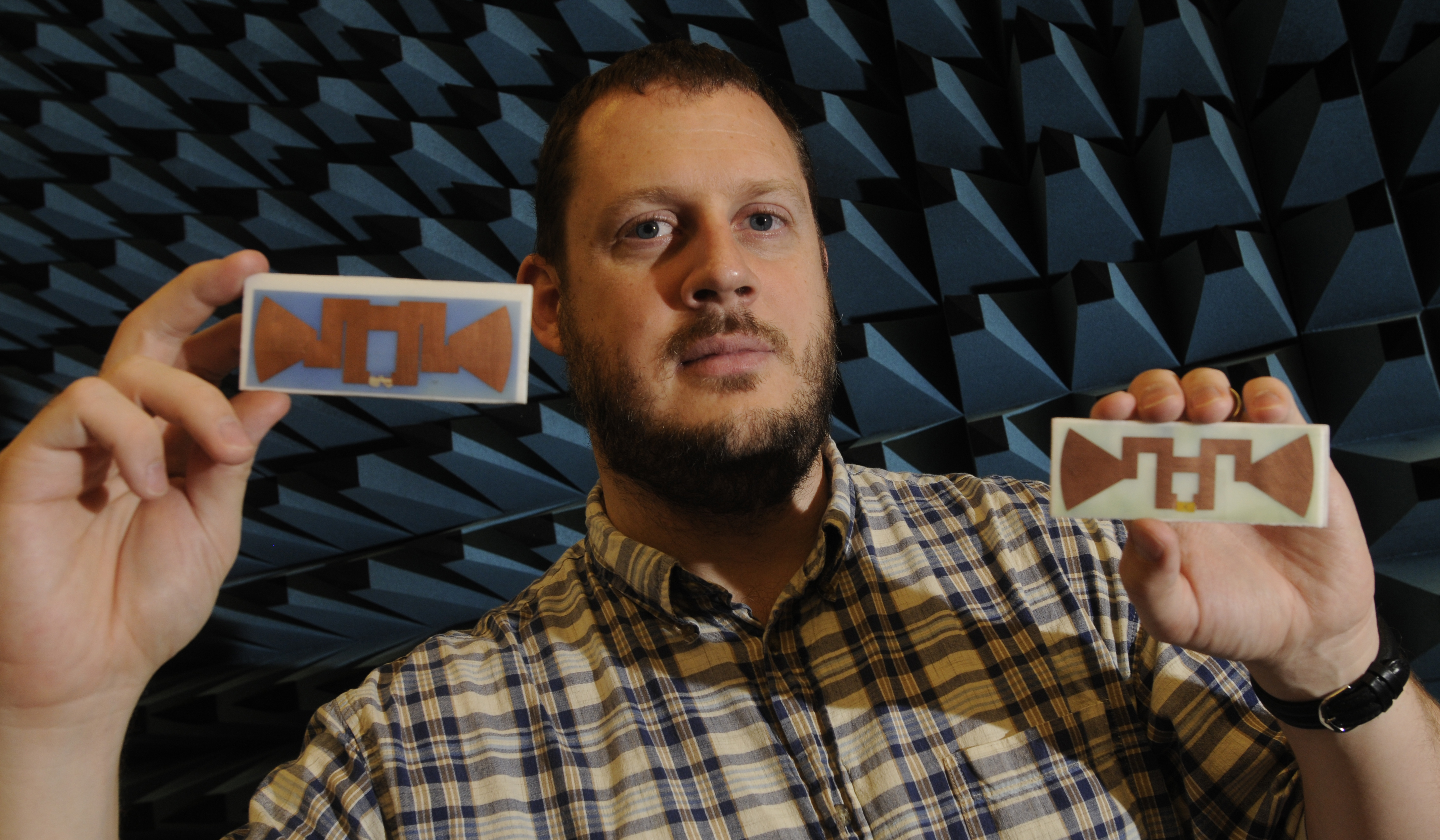Discovery channels: Super phones, biofuels take form in KU laboratories

Dan Deavours, assistant research professor at Kansas University, is testing radio frequency identification (RFID) tags, that are the latest in product inventory management. It's one of several forward-thinking research projects under way right now at KU.

From left, Ilya Tabakh, research associate at Kansas University, and Susan Williams, associate professor of chemical and petroleum engineering look over KU's biofuel setup at a facilities site on West Campus. Williams is leading a team working on using cooking oil and other waste products as cheap biodiesel fuel.
A new sign on the Kansas Turnpike proclaims three major KU accomplishments that passing motorists may want to know: the 2008 NCAA men’s basketball championship; the 2008 Orange Bowl championship and KU’s status as an international research university.
The research designation is listed first.
KU administrators long have made boosting the university’s status as a major research university a top goal.
So, what do KU researchers have cooking that could affect your daily life? Here’s a look:
Super phones
Researchers at KU’s Information and Telecommunication Technology Center are doing the legwork for a world where wireless phones truly will work like powerful computers.
“Your cell phone could become a broadband Internet computer,” said Michelle Ward, the public relations manager for the center. “It would work just as well as the broadband computer sitting in your office.”
The key is television airwaves. KU researchers – led by professor Joseph Evans – have been studying whether devices like wireless phones, Palm Pilots and hotspots can take advantage of unused TV spectrum without messing up the TV industry.
Ward said researchers already have done enough work to know the concept is possible. Now ITTC leaders are just refining the parameters.
Cheaper shipping
In today’s world of high fuel prices, greater costs of the products you buy are related to shipping costs.
Researchers at ITTC are hoping to ease the shipping cost pressures by improving the use of radio frequency identification tags by major retailers and manufacturers.
The RFID technology allows manufacturers and retailers to use computers and radio waves to keep track in real time of their inventories. The thinking is that greater efficiency will cut down on transportation costs.
KU researchers – led by Daniel Deavours – have come up with new technology to tackle the longtime problem of RFID tags performing poorly when they are near metal containers.
Crunching for a cure
To find a cure for cancer, researchers have to crunch billions of pieces of data. KU researchers at ITTC are working to give scientists the computer horsepower they need to get the job done.
ITTC investigator Xue-wen Chen is developing new algorithms that will help researchers manage the massive amounts of data related to the human genome. The new software actually will allow computers to “learn” from the experiences in an effort to identify patterns or networks within the genome.
“Until now, biologists really could only study one gene at a time,” Ward said. “Now researchers will be able to have a big-picture view.”
Friendly fuel
Turning used cooking oil into a new form of biodiesel may help ease the wallet worries of motorists in the future.
Susan Williams, an associate professor of chemical and petroleum engineering, is leading a team working on using cooking oil and other waste products to produce cheap biodiesel fuel.
Currently, the program has figured out how to brew up a batch of biodiesel for less than $1 a gallon. KU leaders plan on using the new 100 percent biodiesel fuels in some of their equipment to test its viability.
“It can make a huge difference,” Williams said. “People don’t really have a lot of confidence right now in biofuels, because they’re really not familiar with them. The more we can do to educate people to help them understand the impact they can have, it’s a good thing.”
KU plans on testing the fuel first in some lawn mowers, but eventually wants to run KU buses on fuel that includes a 20 percent mix of biodiesel.
Reading research
KU researchers have been awarded a $10 million grant to help ensure that poverty-stricken children don’t fall through the cracks when it comes to learning to read.
KU’s Juniper Gardens Children’s Project in downtown Kansas City, Kan., was awarded the five-year grant in May. The new money will fund research to determine the best methods and measuring sticks for determining whether very young children face hurdles in learning how to read.
Charles Greenwood, a professor of applied behavioral science and director of Juniper Gardens, said oftentimes children with reading problems aren’t identified until second or third grade, making it difficult for them to catch up.







